
Be happy with those who are happy, and weep with those who weep.
Live in harmony with each other.
Don’t be too proud to enjoy the company of ordinary people.
And don’t think you know it all!
Romans 12:15-16
Ouch! The first part of that passage may be familiar to you. It makes sense, doesn’t it? Being a compassionate and empathetic person means celebrating and mourning alongside others. Hopefully, that is a rather natural response for most of us. The “living in harmony” part is obviously more challenging, but still a worthy and reasonable goal. It’s that second half of the passage that stings for those of us who can feel like we are living extraordinary lives.
I have a confession to make. Since becoming the parent of a child with complex and extremely challenging needs, I have grown bitter when people cannot really understand certain things about “real” life because their lives are so “ordinary” compared to mine. That is a form of pride.
I admit to resenting people who fail to come alongside families like mine when they are trying to work through ranging emotions — grief included — that often come with a difficult diagnosis. This includes processing the ever-unfolding layers of realization that the diagnosis has turned their lives in a whirlwind of complex logistics and feelings.
For all the joy and richness my daughter, Carly, brings to my life, her daily (and nightly) needs wring me out emotionally. Sometimes there is a deep grief that feels too much to bear.
Each person in my family has experienced grief in their own ways and times too. We try to make room for each other to work through those feelings without feeling judged or edited. (Note to self: it is not helpful to tell others how you think they should feel.)
Our aim, as a family, has been to live according to this biblical principle:
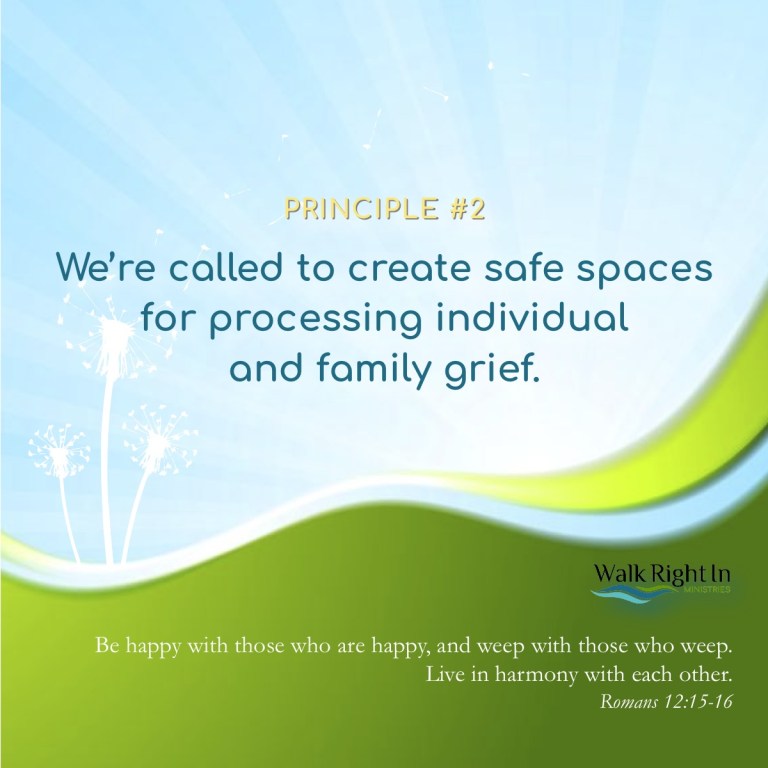
We’re called to create safe spaces for processing individual and family grief.
RELATED: Siblings Needing Safe Spaces to Process Life
Here are some examples of situations that have triggered a cascade of emotions for me. When boiled down to the root of those feelings, I would say there is grief. You can probably relate your own list of grief triggers if you are the parent, spouse, sibling or grandparent of someone with disabilities or a chronic health condition.
- On that Sunday morning, just one week after Mother’s Day in 1998, I sat on the edge of my bathtub sobbing. Our 5-day-old baby Carly had been screaming tears, literally since the moment she was born. When a serious diaper rash erupted that day, it was clearer than ever that she was in some miserable pain. We were all exhausted. I wanted to be at the worship service holding my newborn and celebrating with our church family. I felt robbed of that long-awaited joy. But, more than that, I felt an agony of grief and fear realizing that my child was in unrelenting pain and there seemed to be nothing I could do to fix it for her.
- On October 10th of 2000, Carly’s neurologist phoned to share results of a genetic study that confirmed Carly had Angelman Syndrome. I felt everything from relief in finally knowing to confusion about all that was now unknown about her future, and ours. I felt overwhelmed and afraid. I groaned in the sorrow that a life-long, unexpected and extremely challenging journey was ahead, for all of us.
- As our oldest daughter neared high school graduation, I spent the spring listening to other moms lamenting what would be next for them with an empty house. My sorrow and resentment swelled because I could not anticipate the same flexibility, spontaneity, and new adventures their lives would bring. I was angry with them for taking their freedom for granted.
- At our godson’s wedding, Carly made disruptive noises and grew physically restless. Soon, I had to leave the sanctuary with her. I grieved missing his vows to his wife. I was disappointed I couldn’t hold my husband’s hand while we remembered our own vows. I sorrowed that we would need to hire help with Carly on future days when each of her sisters would get married.
- It is frustrating to miss out on holiday game nights when family or friends gather because someone needs to keep Carly safe, entertained, or in her bedtime routine. I grieve then too.
- I lament the interruptions and limitations that Carly’s needs bring to my time and energy for sex with my husband.
- On the last day(s) of vacations, there is often a sense of weariness and resentment that simmers with thoughts of returning home to the daily slog of caregiving.
- It hurts to miss out on having the kind of social life or traveling lifestyle I imagined having as a middle-aged adult or “empty nester.”
Triggers can become “holy moments.”
I am very thankful that, in time, God transforms many of my grief-triggering experiences into “holy moments.” That discovery process unfolds like this.
First, I have to lay bare what is raw in my heart to God in prayer. For me, that usually takes the form of prayer journaling with my Bible open to listen (read) for God’s voice in the conversation. It might involve curling up in a chair or lying face down on the floor listening to a worship song of surrender too. Then I try to respectfully but transparently share what I am thinking and feeling within the context of a safe relationship (e.g., mentor, counsellor, caregiver discussion group).
That kind of processing becomes an especially sweet gift when the result is deeper bonding with my spouse, one of my children, an extended family member or a friend.
Certainly, there can be catharsis in the simple act of talking things out. But there is so much more to healthy, biblical processing than that. Safe, respectful, and open conversations present opportunities to learn from others’ perspectives, feel less alone, resonate with each other, encourage each other, and sometimes even remind a loved one about where our ultimate hope and comfort come from.
For I am about to fall, and my pain is ever with me. Psalm 38:17
Be merciful to me, O LORD, for I am in distress; my eyes grow weak with sorrow, my soul and my body with grief. Psalm 31:9
The LORD is close to the brokenhearted and saves those who are crushed in spirit. Psalm 34:18
Blessed are those who mourn, for they will be comforted. Matthew 5:4
We don’t grieve without hope. Romans 8:18
Grief has masqueraders.
Grief is real. And it not necessarily bad. Nor should we rush ourselves through it. In fact, we should be careful and intentional about taking time to process it fully in healthy and godly ways. If we don’t, those intense emotions will come out sideways. And things are likely to get really messy, really fast.
Feelings of grief can masquerade in various responses. Unprocessed grief can look like explosive anger, obsessive and/or compulsive behaviors, excessive need for control, jealousy bitterness, resentment, withdrawal from relationships or hiding, depression, anxiety, hopelessness, guilt, fear, and a myriad of other responses that range from vulnerability and weakness to outright sin.
We are created with emotions that reflect the image of God — yes, our Almighty has emotions too. We need only look to the life of Jesus to see that.
Read how Max Lucado explores Jesus’ time of prayer and grief at Gethsemane:
“We’ve never seen Christ like this. Never heard such screams from his voice or seen such horror in his eyes. And never before has he told us:
‘My soul is crushed with grief to the point of death.’ (Mark 14:34)How is such emotion explained? What is Jesus fearing?
Jesus: The God Who Knows My Name by Max Lucado
Christ feared the cup of suffering.
Jesus understands our grief.
Nonetheless, He ultimately submitted to the cross with holy love saying, “Father, if you are willing, please take this cup of suffering away from me. Yet I want your will to be done, not mine.” (Luke 22:42)
When we see Jesus at the cross, we recognize the sacrifice and atonement he made for our sins. But it is in the garden of Gethsemane that we see a depth of Jesus’ emotions. And we feel them with him.
Jesus understands our desperation.
Here’s some really good news…
GRIEF & JOY CAN BE EXPERIENCED SIMULTANEOUSLY
In everything we do, we show that we are true ministers of God. We patiently endure troubles and hardships and calamities of every kind. We have been beaten, been put in prison, faced angry mobs, worked to exhaustion, endured sleepless nights, and gone without food. We prove ourselves by our purity, our understanding, our patience, our kindness, by the Holy Spirit within us, and by our sincere love. We faithfully preach the truth. God’s power is working in us. We use the weapons of righteousness in the right hand for attack and the left hand for defense. We serve God whether people honor us or despise us, whether they slander us or praise us. We are honest, but they call us impostors. We are ignored, even though we are well known. We live close to death, but we are still alive. We have been beaten, but we have not been killed. Our hearts ache, but we always have joy. We are poor, but we give spiritual riches to others. We own nothing, and yet we have everything.
2 Corinthians 6:4-10
QUESTIONS FOR PERSONAL REFLECTION
- King David expressed his emotions honestly with God. (Read Psalm 73 for a great example of authentic, God-honoring grief!)
Can you describe your pain and when you feel it most deeply? - What grief triggers have you or a family member experienced recently?
- What is helpful to you when you are feeling emotional?
- Has God given you a “holy moment” in the midst of your sadness or fear recently?
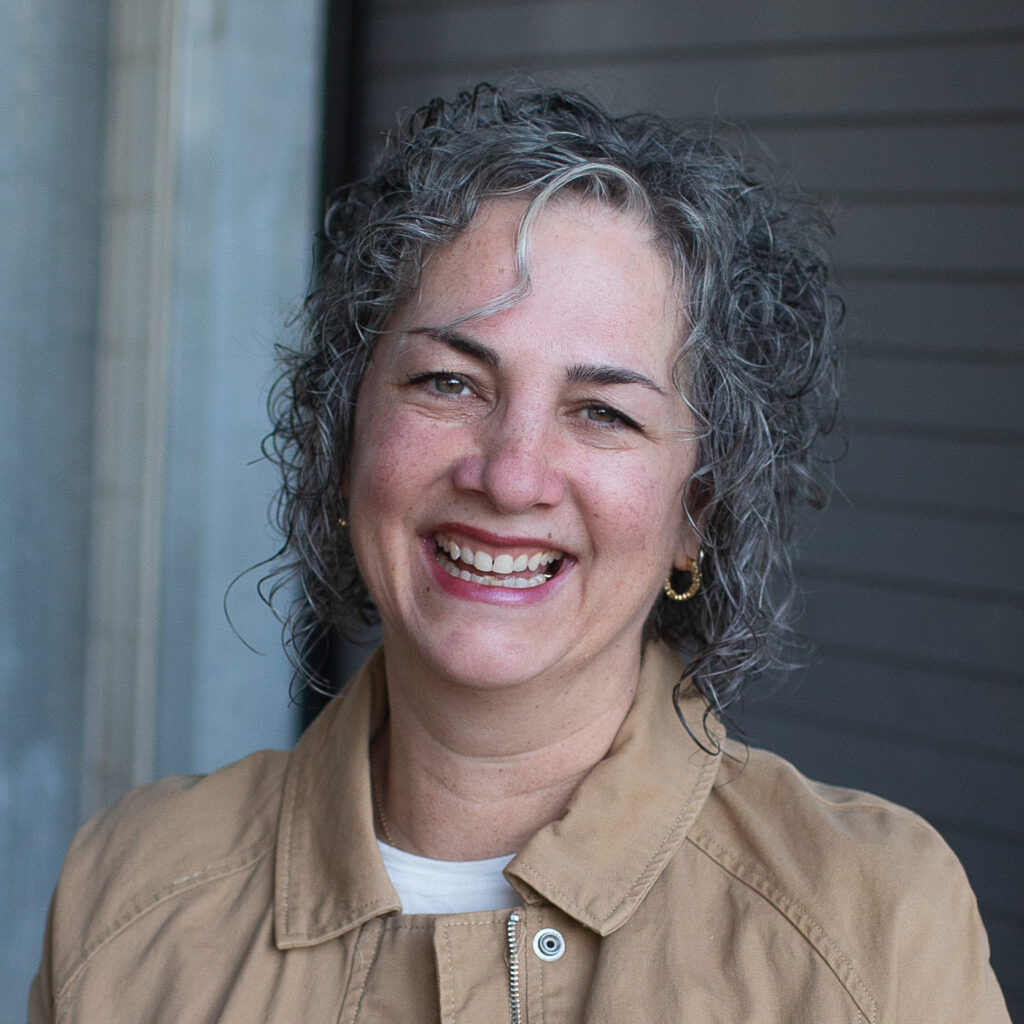
Lisa Jamieson is a caregiver consultant, pastoral counsellor and author of popular books and Bible studies including Finding Glory in the Thorns and Jesus, Let’s Talk. She leads a weekly online discussion group welcoming caregivers in families living with disability. Lisa and her husband, Larry, are co-founders of Walk Right In Ministries, a non-profit organization building faith and community with special needs families. They live in Minnesota with the youngest of their three grown daughters, Carly, who has Angelman Syndrome.
I hope you’ll consider joining us some time for Real Talk Connect. Caregivers from many backgrounds meet every Tuesday at 2 pm Central on Zoom. We use one Bible principle as the theme for each week’s discussion. Today’s blog was based on one of those principles — We’re called to create safe spaces for processing individual and family grief.
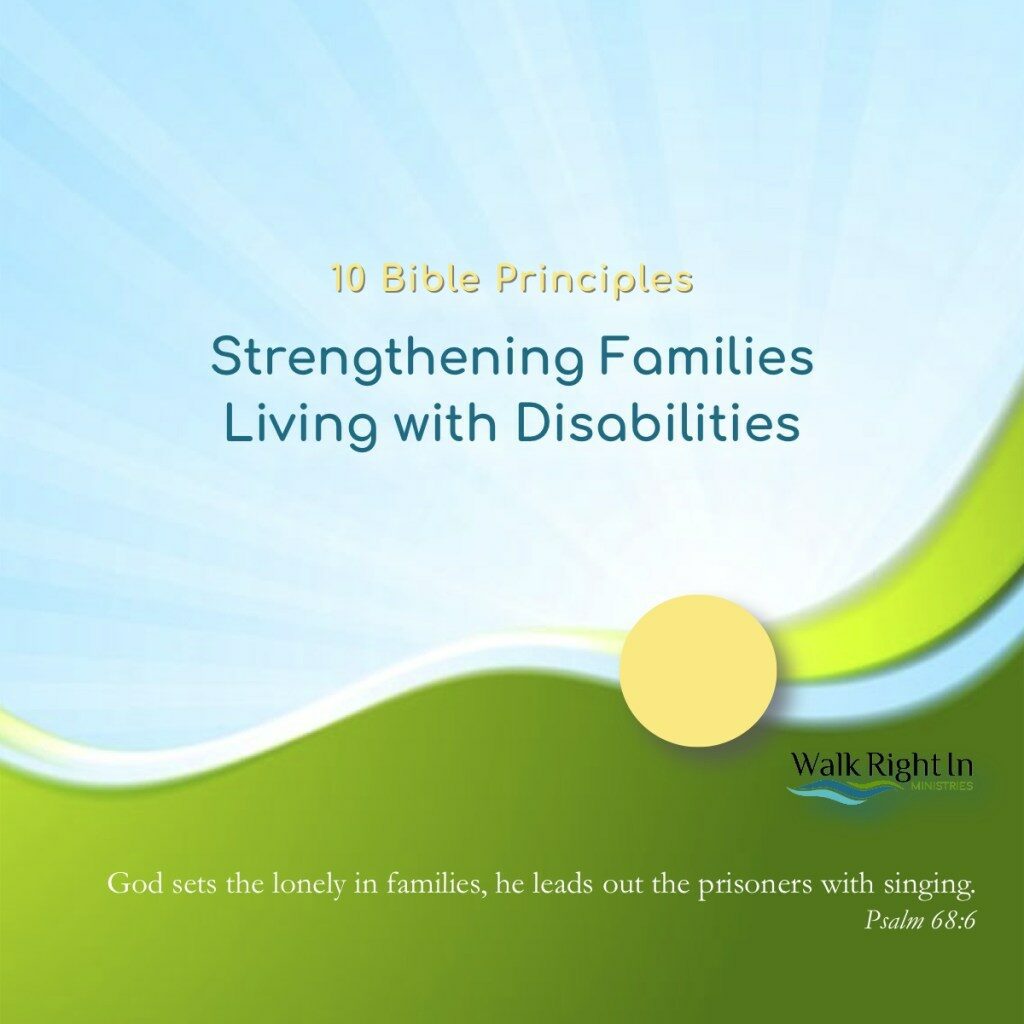


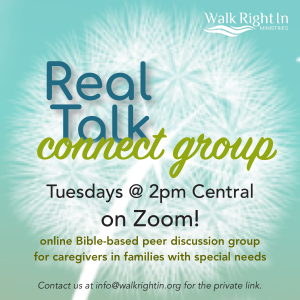
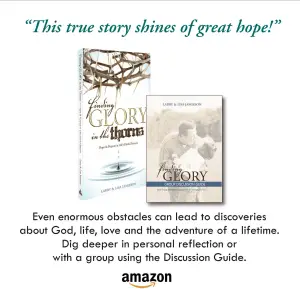



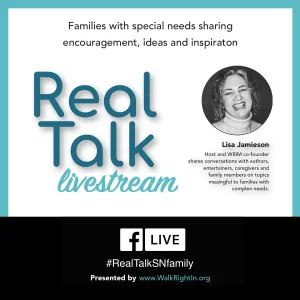
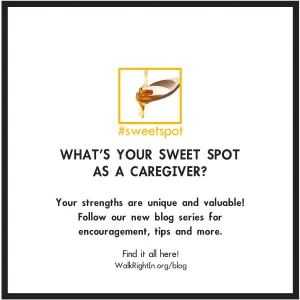

Thank you Lisa! Grief is hard. This article is encouraging